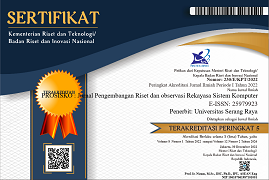PENGARUH INFRASTRUKTUR TELEKOMUNIKASI TERHADAP PERTUMBUHAN EKONOMI DI PROVINSI BANTEN TAHUN 2004 -2013
Abstract
Telecommunications today is one very important thing in life, communication services is perceived by society. Selullar role of communications technology in particular has a positive impact on the improvement of economic income people, this happens in Banten province as a province of the capital buffer beloved country. In this study will be analyzed is there a significant relationship between Telecommunications infrastructure for economic growth areas in Metro Manila and also want to know how big the impact, telecommunications infrastructure represented by a mobile phone that is the number of BTS (Base transciever Station) and economic growth represented by GDP (Gross Regional Regional Income), to be able to know the purpose of this study used methods of early determination and proceed with Least Square Regression method to get the value of the amount of Telecommunications Infrastructure influence on economic pertubuhan in Banten. In the hope of this study will be made as a recommendation to the local government in order to provide the rules or policies of the telecommunications sector in order to be useful for society optimally and uniformly across the province of Banten. By sampling data from years 2004 -2013 or 10 years is found that: Telecommunications and GDP growth in Banten province showed a significant relationship, it is shown by the test results with the method of determination (R2) is equal to: 0.993. Having held testing the relationship between telecommunications infrastructure in this case represented by the BTS to GDP growth in Banten in getting a regression value of 0.134% means that it indicates that every increase of 1% BTS will contribute to the increase of GDP by 0.134%.References
Abdi, Zainal.(2006) Industri Telekomunikasi: Lokomotif Pertumbuhan Ekonomi danKemajuan Bangsa, Jakarta, LP FEUI
Alleman, James etc (2003), Telecommunications and Economic Development:Empirical Evidence from Southern Africa, International Telecommunications Society, Sydney
Amitava Dutta (2001), Telecommunications and Economic Activity: An Analysis of Granger Causality
Azlima Azmi Fatimah Said (2007), Sumbangan Infrastruktur Telekomunikasi Terhadap Pertumbuhan Ekonomi Malaysia, IJMS 14 (1), 143-166.
Banten dalam angka 2008, 2012
Datta, A. and Agarwal, S. (2004). Telecomunications and Economic Growth: A Panel Data Approach, Applied Economics 36(15): 1649–1654.
David Oladipo Olalekan (2013), The Effect of Investment in Telecommunication on Economic Growth: Evidence Form Nigeria, International Journal of Advancements in Research & Technology, Volume 2, British.
Ding and Haynes (2006), The Role of Telecomunications Infrastrukture in Regional Economic Growth in China, Australasian Journal of Regional Studies, Vol. 12, No. 3
Direktorat Jenderal Pos dan Telekomunikasi (2013), Kementerian Kominfo. Data Statistik Semester I, Jakarta.
Greenstein, S. and Spiller, P. (1995). Modern Telecommunications Infrastructure and Economic Activity: An Empirical Investigation, Industrial and Corporate Change 4(4): 647–665
International Telecommunications Union, ICT Statistics 2005
Kawaljeet Kaur & Neena Malhotra (2014), Telecomunications and Economic Growt in India: International Journal of Research in Business Management,India.
Laporan Tahunan Operator Telekomunikasi melalui website masing-masing operator.
Martin chege wainaina (2012), Telecomunication Infrastructure and Economic Growth: A Case of Sub-Saharan South Africa (1988-2010), Faculty Economic of Kenyatta University, Kenya.
Nachrowi D Nachrowi. dan Hardius Usman (2006). Pendekatan Populer dan Praktis Ekonometrika Untuk Analisis Ekonomi dan Keuangan, LP FEUI, Jakarta.
Richard Cebula and Nate Herder (2009), Recent Evidence on Residential Electricity Consumption Determinants: A Panel Two-Stage Least Squares Analysis, 2001-2005, Jacksonville University, Armstrong Atlantic State University
Rindang Bangun Prasetyo dan Muhammad Firdaus (2009), Pengaruh Infrastruktur pada Pertumbuhan Ekonomi di Indonesia, Departemen Ilmu Ekonomi, Fakultas Ekonomi dan Manajemen, Institut Pertanian Bogor
R¨oller, L. and Waverman, L. (2001). Telecommunications Infrastructure and Economic Development: A Simultaneous Approach, American Economic Review 91(4): 909–923
Setiawan (2011), Kontribusi Industri Telekomunikasi Terhadap Pertumbuhan Ekonomi, FE-UI, Jakarta


















